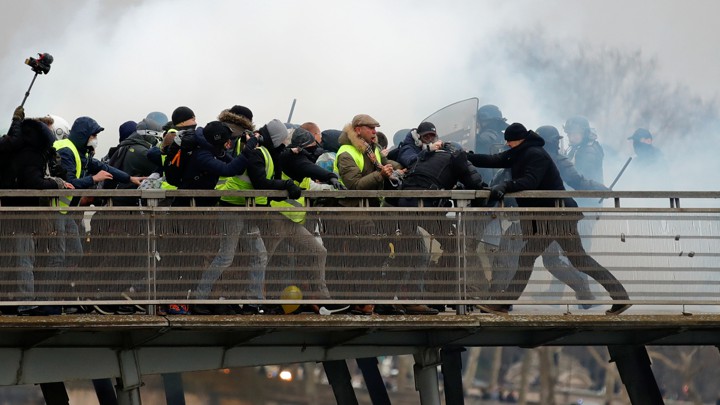
French President Emmanuel Macron is trying to figure out what they want. It’s not an easy task.

For months now, President Emmanuel Macron has been crisscrossing the country for a grand débat, a series of town meetings he called in January to address the discontent embodied by the “yellow vest” movement. These demonstrations began as a protest of a fuel-tax hike and have now evolved into a wave of economic anxiety and anti-establishment sentiment—with bursts of violence, such as the torching of banks and businesses in Paris this past weekend. The latest incidents, part of “Act 18” of the movement’s weekly Saturday protests, were planned to mark the end of the grand débat.
The French president has been trying to claw back the support of local officials and citizens who felt ignored by a leader they saw as arrogant and out of touch, something of a populist in his own right who seemed to have little use for traditional mediators—mayors, unions—that stood between him and the people. Thousands have come together during the debates in a spirit of solidarity, discussion, and political engagement.
Many of these debates have come to their scheduled end, so the question arises: Now what?
How should an elected government contend with an upswell that represents a lack of faith in the institutions of representative democracy? How should the authorities respond when there’s no logical political outlet for the discontent, when the movement, on principle, refuses to select leaders or become a party? Above all, how should Macron and his government respond to a movement that has strong elements who are in opposition not simply to policies, but to representative power itself?
“In a way, it’s a revolution,” Sylvie Kauffmann, a columnist for Le Monde, told me about the grand débat. “I don’t want to use grand words, but it’s something unprecedented.” France lacked the American tradition of town meetings, she noted, but during past crises, the governments of the day always had clear interlocutors, whether student leaders in 1968 or labor unions in other turbulent seasons. That has changed. “We don’t have the right tools—they’re not in the constitution,” Kauffmann said. “This is something new.”
Macron’s approval ratings have been creeping upward, and on each successive Saturday, the protests have seen fewer people turn out, though Act 18—so named for the number of consecutive weeks the protests have been ongoing—was marred by violence by hard-core troublemakers. A survey conducted by the IFOP polling agency and published last week (between Acts 17 and 18) found that half the French population supports the yellow vests, although a similar proportion wants the disruption to stop.
In that sense, the grand débat might already have succeeded. The effort “had one main goal, which was to lower the temperature and give a bit of air to Macron,” Jérôme Fourquet, who conducted the survey for IFOP, told me. Citizens came together, and there was a sense of camaraderie and solidarity, of being seen and heard. “It was a nice operation in which he connected with and debated with the population, and that worked pretty well,” Fourquet said. “But difficulty has set in today: How do we get out of the grand débat? And how not to ruin the outcome and produce disappointment?”
Macron has said he’s open to the possibility of holding a citizens’ initiative—a referendum—such as on whether to reduce the number of members of the National Assembly, a request that has emerged during the debates. On other issues, though, he has limited room to maneuver. He has said he won’t reinstate a wealth tax or reduce France’s value-added tax, in spite of pressure from grand débat participants to do so. (Among the central contradictions of the yellow-vest movement and their supporters is a desire for lower taxes and more state services.) Other requests that have emerged in the debates are the possibility of choosing representatives by lottery, giving people in rural areas better access to hospital services, and allowing voters to cast blank ballots—that is, voting but without choosing a candidate.
In a recent interview in Le Monde, the economist Jean Pisani-Ferry observed that the crisis transcends Macron’s personality as the embodiment of “metropolitan France” and a target for the anger of rural France, which feels left behind. The problem goes deeper, Pisani-Ferry argued, in that 20th-century ideologies—communist, socialist, Gaullist—have collapsed and have been replaced by socioeconomic strata. “Now what’s dangerous for democracy is the feeling that half of the population has been shunted aside. The absolute priority has to be to find some common ground,” he said.
Philippe Laurent, the mayor of the city of Sceaux, just outside Paris, and the secretary-general of the association of French mayors, told me he wasn’t convinced that Macron had actually won over mayors during his grand débatroad show. “When he says hello, people say hello because they’re polite,” he said, but Macron, a technocrat, lacks the political culture of his predecessors, who had more on-the-ground experience. “Someone tells him, ‘You have to cajole the mayors.’ He says, ‘Okay.’ But he’s not convinced of the necessity of understanding how the country works. The country is much more complex than he understands.”
Macron, who was finance minister under Socialist President François Hollande, rose to power in 2017 on a lucky star by bypassing the Socialist Party and starting his own movement. Presidential elections in France have two rounds of voting—first with the heart, then with the head, the saying goes. Macron took about a quarter of the votes in the first round, slightly more than his far-right opponent, Marine Le Pen. He then won a solid majority to defeat Le Pen in the second round, and subsequently won a majority of seats in the National Assembly. To some degree, he has a majority government with a minority of the country’s support.
Yet while Le Pen has more public support than seats in the National Assembly, and has publicly courted the yellow vests (she has said she has “supported the yellow vests from the outset”), they have not actively embraced her party, or indeed any party. Yellow-vest demonstrators have also professed their dislike for France’s mainstream media—even though these outlets helped give them a platform—and their enthusiasm for RT, the broadcaster formerly known as Russia Today, as well as sites such as Brut, which provide live feeds without mediation. “The yellow-vest movement mistrusts everything that we call intermediary bodies—it could be the media, local elected officials, unions,” Fourquet, the pollster, told me.
Is the president?
We want to hear what you think about this article. Submit a letter to the editor or write to [email protected].




